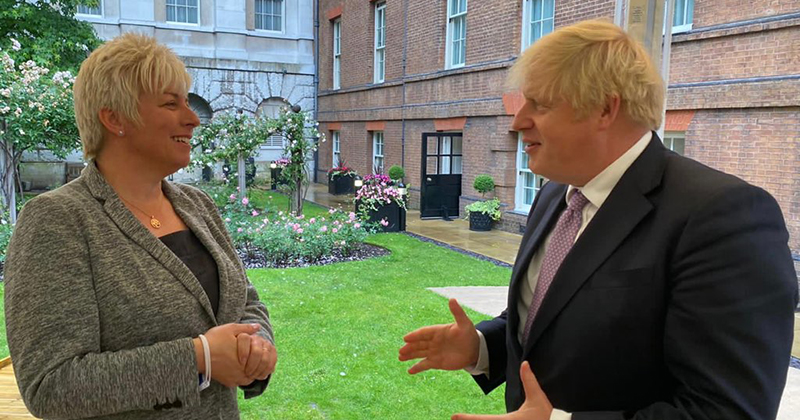Lia Nici is the first ever FE teacher to be the prime minister’s ‘eyes and ears’ in Westminster – his parliamentary private secretary. She tells Jess Staufenberg why complaining about the system is not the answer
Lia Nici is waving at me from the other end of Portcullis House. There’s a relaxed Thursday afternoon feel as I head over – politician bingo locates Jeremy Hunt in the lunch queue, Daisy Cooper of the Lib Dems crossing the floor, Jeremy Corbyn with young people at a table. Welcome to the home of UK MPs in Westminster.
Nici herself is far from home – she is four-and-a-half hours away from her constituency, which clings to the coast of north-east Lincolnshire. I’ve come because Nici is a number of intriguing “firsts”.
She is a “red wall MP” – Great Grimsby voted her in as its first Conservative MP in 70 years in 2019. And she surely must be the first FE teacher to be a parliamentary private secretary to a prime minister.
But she is not, she tells me, in a vanishing minority as a Tory FE teacher. “As soon as I came out as a Conservative, it was interesting at work,” she grins. “People would come up in the corridor, and say quietly, ‘I vote Conservative too!’”
Right on cue, Nici waves to a colleague on the next table who Nici says is a former headteacher. So it was a positive experience? I ask.
“Sadly I’ve got colleagues, some of them union representatives, who were great colleagues but as soon as they knew I was a Conservative, they refused to speak to me,” she says.
Some colleagues refused to speak to me
“It’s really sad that in an educational institution, people feel so under pressure they can’t be open that they are a Conservative.”
Of course, there are some awkward facts to mention. Under her party, funding per student aged 16 to 18 fell by 14 per cent in real terms for further education and sixth-form colleges between 2010 and 2019. Spending on adult education fell by 49 per cent.
Meanwhile, apprenticeship starts for learners aged 19 and under have nearly halved since the levy was introduced.
For many, the Conservatives’ cuts to the FE sector have been unforgiveable. What makes Nici a Conservative?
She takes me to her childhood. Her mum was a born-and-bred Grimsby girl who was in the police force until she married Nici’s dad, an Italian, and together they ran a restaurant.
“Both my parents came from poor backgrounds, but they worked hard to better themselves,” says Nici, who grew up in the flat above the restaurant. “That ethic was always there. If your skills are good enough, there is always someone who will pay you.”

Nici remembers a family friend offering advice for her first job in a florist. “She said: ‘Don’t forget, when you’re working, someone is paying you to work for them. There’s always a job to do to help that business.’
“That’s what makes me a Conservative. Through your own endeavours, and with supportive others, there’s always some way you can develop.”
Overcoming the odds has a close-to-home meaning for Nici. “I’ve had a few challenges in my life, and I always say, nothing is insurmountable or not solvable. Apart from death,” she tells me.
“When you’re dead, you can’t do anything. While you’re alive, you’ve always got an ability to improve a situation.”
When she was just 12, Nici’s father took his own life.
As a single parent, her mum took on multiple jobs, and went on to become a social worker. “Throughout my whole life, the key influence has been my mum.”
Nici greatly enjoyed sixth form, focusing on art as her favourite subject, but a debilitating bout of glandular fever contributed towards “terrible results” in her A-levels, and she took an art foundation course at Grimsby College, now Grimsby Institute.
Rather than go to university, she had her eye on entering the television industry straightaway, partly inspired by her father. “My dad was a photographer. He would convert the bedroom into a dark room, and he taught me about shot composition.”
So she did a higher national diploma in writing and design and got some work at the National Film and Television School. She later moved to Newcastle as a runner for the BBC’s children’s series Byker Grove with Ant and Dec (then PJ and Duncan), working her way up to assistant director.
After the BBC, Nici set up her own TV production company, working on corporate films. It was a male-dominated world, she tells me.
“A woman coming in with the camera on her shoulder was unusual.” She laughs as she remembers asking men at work to remove posters of topless women from the shot: “‘Would you mind taking that calendar down while I film, please?”.
But the reality of “standing in the pouring rain” as a camera operator began to bite, and she applied to be a college lecturer at her alma mater, Grimsby College.

She would stay in FE for 22 years, teaching video production and other media qualifications from entry level through to HE, until it became, she says, “one of the most highly regarded media departments in the country”.
Is being an FE teacher good preparation for being an MP?
“It is absolutely perfect. I think education is one of the toughest areas to work in. In this job, you need a lot of resilience too.” As in teaching, Nici now works a six-day, sometimes seven-day, week.
But Grimsby felt like a forgotten town, she says. Her local Labour MP, the late Austin Mitchell (in post from 1977 until 2015), was “wonderful” – a working-class Brexiteer who should “really have been a Tory”, she says. But it was frustrating that Mitchell was usually stuck in opposition.
So she became a parish councillor for her village, then a ward councillor. Soon the Conservatives gave her Hull North, an unwinnable seat, to try for parliament.
Being heckled in a Labour stronghold was “terrifying”, she says, as was putting campaigning costs “on my credit card”. But she loved the debates, and in 2018 took voluntary redundancy from Grimsby Institute.
However, making her views known in Great Grimsby had a more unnerving consequence. A local man began harassing her.
“It started with little comments, like ‘you’re a Tory’. Then he’d block us into our lane and wouldn’t let us out with the cars. It really ramped up when I was selected to stand.”
Nici won her seat in 2019, with a majority of about 7,000 votes, but it was only in October last year that her 49-year-old harasser was fined. She tells me she worries about the “black and white” world of opinion today.
To be fair to Nici, she appears to listen closely and answer my questions frankly, without contortionist political double-speak.
But she can come across as fairly black and white herself.
A general loyalty to Boris Johnson as a red wall MP is perhaps to be expected, yet she raises no word of criticism about lockdown parties in Downing Street (and during our conversation, the new chief whip Chris Heaton-Harris comes along to say hello). Rather, she has called him the “best” prime minister.

She recalls first meeting Johnson at 5am in Grimsby fish market, “with everyone getting on their trilby hats and white overalls”. Now she is his PPS and her job is to feed back issues among MPs to Number 10.
I should say we are speaking before Johnson was handed his fine in mid-April for breaking lockdown rules in 2020 (making him the first ever prime minster to be found to have broken the law).
“He has apologised,” she begins. “But my concern is, if people were so angry at the time, why didn’t someone report it then, rather than to the press 18 months later?”
Although this is a valid question, I’m not sure it’s of greater concern than the prime minister’s top team breaking the rules they had set for the nation.
She adds, by way of an excuse: “Westminster and Number 10 is a very strange location, in that it’s both work and the prime minister happens to live there.”
Nici also wholeheartedly backs the move to T Levels – bluntly telling shadow skills minister Toby Perkins in December that “BTEC is just a brand name of the Pearson group”.
Nici explains to me she felt some MPs were forgetting that other brands, such as City & Guilds and Cambridge Nationals, are also in the same space as BTECs, and felt “they were being lobbied by Pearson… I was being a bit naughty,” she acknowledges.

Nor does she mince her words on FE funding.
“FE never has enough money,” she says. But “funding isn’t everything. When the New Labour government came in in 1997, and flooded money into FE, in my opinion it was wasted.
“It didn’t get spent on students, it was spent on brand new computers for people, better working environments and members of staff. It didn’t get to students.” It’s a bold claim.
“The bottom line is that having a passionate lecturer in the work environment is the most important thing,” she says, adding that in that respect, “it didn’t make a difference whether a lecturer was on £23,000 or £33,000”.
But we know salaries impact on whether passionate lecturers stick around.
It all comes back to Nici’s self-starter mantra. “People say to me, ‘Oh it’s the system’, but I say, ‘We are the system.’
It’s about having that positive mindset to say, ‘Yes, we’ve got challenges, but we’ve also got opportunities’.” She says: “FE colleges are corporations, and it’s down to corporations to make choices.”

So Nici’s rise to Johnson’s side does not appear to mean the sector has a staunch champion for funding in Number 10 (despite being appointed an ‘FE ambassador’ by Gavin Williamson).
She does speak enthusiastically about the importance of greater diversity in apprenticeships, as chair of the government’s Apprenticeship Diversity Champions Network, which brings together employers.
But she seems most passionately committed to upskilling her constituents in Grimsby, and has warned the levelling-up agenda must deliver “physical change” for them – or she will likely lose her seat.
It’s been a fascinating conversation. Perhaps if Nici does lose her seat in 2024, she could return to the sector she left as a principal, bringing her all-positive mindset to the extremely tight circumstances leaders operate under.
Of course, she should never be made to feel like an outcast on her return.









Your thoughts